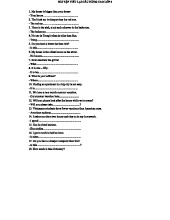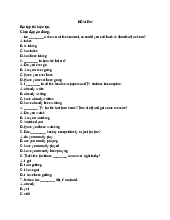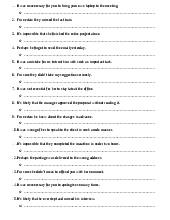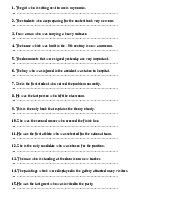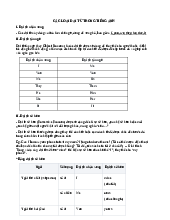











































































































Preview text:
UNIT 1: MY NEW SCHOOL A. PHONETICS
I. Put the words into the correct column. lunch far smart study hard sharpener compass schoolyard subject alarm rubber Sunday month large fast /a:/ /ʌ/
II. Choose the word whose underlined port is pronounced differently from the others. 1. A. computer B. compass C. fun D. month 2. A. c a rd B. fa r m C. a rt D. s ha re 3. A. eat B. breakfast C. teach D. seat 4. A. grammar B. calendar C. father D. calculator 5. A. lunch B. watch C. school D. chess B. VOCABULARY
I. Put the words into the correct group. calculator father football textbook mother English school bag maths teacher physics judo rubber student history chess compass basketball friend ruler science classmate badminton pencil case Vietnamese
1. People: ___________________________________________________________________
2. Sports and games: __________________________________________________________
3. School subjects: ____________________________________________________________
4. School things: ______________________________________________________________
II. Put the words into the correct column. judo breakfast maths housework the violin lunch chemistry volleyball dinner grammar the guitar homework friends geography pop music the ironing English karate classmates exercise basketball physics notebooks badminton do play study have
III. Choose the best answer to complete the sentences.
1. I have a new _______, but I don‟t wear it every day. A. pencil case B. notebook C. bicycle D. uniform
2. You can borrow books from the school _______. A. yard B. canteen C. library D. garden
3. My pencil is not sharp any more. I need a pencil _______. A. sharpener B. case C. eraser D. head
4. What do you usually do _______ break time? A. on B. in C. at D. about
5. In the afternoon, we learn to draw, swim, or do _______. A. football B. science C. judo D. lunch
6. We study many _______ - maths, science, English, etc. A. exercises B. grades C. subjects D. units
7. My best friend usually plays football in the school _______. A. park B. garden C. playground D. club 8. Mary studies in
school. She doesn‟t go home every day. A. a boarding B. an international C. a new D. a high 9. The unit has a list of . It‟s about 30 words. A. lesson B. vocabulary C. grammar D. homework
10. I‟m in grade 6, but that English is for grade 7. A. textbook B. schoolbag C. compass D. calculator C. GRAMMAR
I. Complete the sentences using the present simple.
1. He usually _______ (go) to school on time.
2. _______ (Ms. Lucy, teach) English in your school?
3. Bella _______ (not remember) her new friends‟ names.
4. My new school _______ (have) a judo club.
5. The students _______ (study) maths every Wednesday.
6. Every day, Susan _______ (take) her sons to school.
7. _______ (you, help) your mother to do the laundry?
8. John _______ (not like) doing homework.
9. Duy and Quang _______ (not join) our football team.
10. The sun _______ (rise) in the east and _______ (set) in the west.
II. Change the sentences into the negative form and question form.
1. Joe uses pencils with erasers on top.
___________________________________________________________________________
___________________________________________________________________________ ?
2. Henderson reads many science books.
___________________________________________________________________________
___________________________________________________________________________ ?
3. Jennifer is busy with her homework.
___________________________________________________________________________
___________________________________________________________________________ ?
4. We go to the classroom in sequence.
___________________________________________________________________________
___________________________________________________________________________ ?
5. I come straight home after school.
___________________________________________________________________________
___________________________________________________________________________ ?
6. The playground of the school is full of people.
___________________________________________________________________________
___________________________________________________________________________ ?
7. Albert is her classmate in junior high school.
___________________________________________________________________________
___________________________________________________________________________ ?
8. They do experiments in the greenhouse.
___________________________________________________________________________
___________________________________________________________________________ ?
9. The teacher gives paper to all the children.
___________________________________________________________________________
___________________________________________________________________________ ?
10. Physics and English are your favourite subjects.
___________________________________________________________________________
___________________________________________________________________________ ?
III. Choose the correct answer.
1. (Rarely he/ He rarely) gets up before noon.
2. She (never swims/ swims never) in the sea.
3. (Never I see/ I never see) Julia at any school festivals.
4. This cinema (often doesn‟t/ doesn‟t often) offer free tickets.
5. Those kids (always are/ are always) late for breakfast.
6. Michael (is rarely/ rarely is) angry at his friends.
7. Brian (isn‟t usually/ usually isn‟t) satisfied with his marks.
8. Simon (often leaves/ leaves often) home for school before 7 a.m.
9. She (sometimes has/ has sometimes) a walk in the evenings.
10. We (seldom write/ don‟t seldom write) to our grandfather.
IV. Choose the best answer to complete the sentences.
1. Linh _______ lunch with her best friend. A. always have B. always has C. has always D. have always
2. Your school bag _______ heavy. A. looks B. look C. is look D. are look
3. We _______ shuttlecock at break time. A. often plays B. play often C. often play D. plays often
4. The food in the canteen _______ quite good. A. usually are B. are usually C. usually is D. is usually
5. I _______ football, but my brother _______ badminton. A. likes - like B. like - likes C. am like - is like D. like - is likes
6. Julia _______ excited when a new school year _______. A. feels always - starts B. feel always - start C. always feels - start D. always feels - starts
7. _______ worried about my results at school. A. I never am B. Never I am C. I am never D. I‟m not never
8. I _______ my cousin by his real name. A. usually don‟t call B. don‟t call usually C. don‟t usually call D. doesn‟t usually call
9. Hector _______ the last one to leave the room. A. never is B. is never C. isn‟t never D. never isn't
10. Our teacher _______ strict when he _______ a lesson. A. is always - has B. is always - have C. always is - has D. always is - have
V. Choose the word or phrase that needs correcting. 1. How are your first day a s t chool, Duong? A B C D
2. Huong and Duyen doesn‟t have English lessons on Tuesdays. A B C D
3. My cousin‟s school is has 7 classes and about 300 students. A B C D
4. She always is punctual, but her friend is always late. A B C D
5. I do my homework and watches TV every evening. A B C D D. SPEAKING
I. Match the sentences.
1. What do you do after school? a. Yes, Mum.
2. I am John. Nice to meet you. b. Maths.
3. Do you wear uniform at school? c. Oh, wonderful. 4. You can use my calculator.
d. I am Mary. Nice to meet you, too. 5. How do you go to school? e. Yes, I do.
6. Does Mary live near her school? f. By bus.
7. How is your first day at school? g. Thanks so much.
8. What is your favourite subject at school? h. No, she doesn‟t.
9. Put on your shoes, and let‟s go. i. I practise judo.
10. Where are they playing football? j. In the playground.
II. Put the sentences in the correct order to make a conversation.
___ Hi, Mai. Are you ready?
___ How beautiful! It's such a great present.
___ Yes, it is. It‟s my father‟s present for the new school year.
___ Thanks, Mai. Is that your new bag?
___ Yes, just a minute. Oh, you‟re wearing the new uniform. You look smart, Lien! 1 Hi, Lien.
___ Thank you. Let me put on my uniform. Then we can go to school. ___ Sure, Mai. E. READING
I. Read the passage and answer the questions.
A primary school, or an elementary school, is a school for children between the ages of about
six and twelve. It comes after preschool. When children finish learning at primary school, they go to secondary school.
In the United Kingdom, a primary school usually comprises a nursery and the first seven years
of a child‟s full-time learning. In Australia and the United States, primary school begins with
kindergarten. It lasts for six years, usually until the fifth or sixth grade.
In Singapore, primary school refers to those students who are normally between the ages of 7
to 12. Primary School is classified as Pl to P6 for Primary 1 to Primary 6 respectively. At the end of
P6, students sit for a national level Primary School Leaving Exam (PSLE) which is used for
placement into Secondary School. Prior to Primary School, pupils attend Kindergarten School for 2 years. 1. What is a primary school?
2. Does primary school come after preschool?
3. Where does a primary school comprises a nursery and the first seven years of a child‟s full-time learning?
4. Where does primary school begin with kindergarten?
5. In Singapore, who does primary school refer to?
6. When do the students in Singapore sit for a national level Primary School Leaving Exam?
II. Fill in each blank with a word in the box. classroom learning know again enjoyable subject
A lesson in school is a planned period of time for (1) _______ . It involves one or more
students being taught by a teacher. A lesson may be either one section of a textbook or a short
period of time during which learners are taught about a (2) _______ or taught how to perform an
activity. Lessons are generally taught in a (3) _______ but may instead take place in a situated learning environment.
Also, a lesson means a learner learning something he did not (4) _______ before. Such a lesson
can be either planned or accidental, (5) _______ or painful. The slang phrase “to teach someone a
lesson”, means to punish or scold a person for a mistake they have made to make sure that he does
not make the same mistake (6) _______ . F. WRITING
I. Rearrange the words to make meaningful sentences.
1. is/ school/ an/ place/ My/ interesting
2. Peter/ like/ computer science?/ Does
3. often/ Ms. Thy/ a/ pink dress/ wear/ doesn‟t
4. do/ How/ you/ go/ school/ every day?/ to
5. good at/ I‟m/ not/ usually/ playing sports
6. you/ Do/ play/ with/ often/ football/ your friends?
7. every morning/I/ walk/ school/ my sister/ to/ with
8. friends/ they/ nice/I/ me/ and/ are/ have/ a lot of/ to
II. Rewrite the sentences so that it has the words in
brackets. 1. Do Phong, Duy and Vy walk to school? (usually)
2. Kelvin reviews the lesson in the morning. (rarely)
3. Are Gwen and Anna busy on Fridays? (normally)
4. The streets are crowded at this time of the day. (always)
5. The children have beefsteak for lunch. (seldom)
6. They don‟t do exercise at the weekends. (often)
7. I forget to turn off the lights before leaving the room. (sometimes)
8. The canteen doesn‟t run out of drinking water. (frequently) UNIT 2: MY HOUSE A. PHONETICS
I. Put the words into the correct column according to the pronunciation of ending sound. chairs flats floors roofs rooms toilets shops posters desks doorsteps kitchens clocks walls lamps wardrobes /s/ /z/
II. Choose the word whose underlined part is pronounced differently from the others. 1. A. tables B. lights C. villas D. windows 2. A. suburbs B. books C. streets D. safes 3. A. markets B. camps C. schools D. parks 4. A. gardens B. beds C. parents D. halls 5. A. drawers B. sofas C. photos D. attics B. VOCABULARY
I. Put the words into the correct groups. apartment attic country house picture stilt house bathroom cupboard bedroom bookshelf town house vase villa table kitchen hall chair living room sofa toilet wardrobe Types of buildings Rooms Furniture
II. Choose the correct word(s) to complete the sentences.
1. Her family‟s _______ is on the fifteenth floor. (flat/ town house)
2. My sister is washing the dishes in the _______ now. (kitchen/ attic)
3. Susan wants to sit on the _______ next to the window. (table/ chair)
4. Frank will take a _______ before wearing the new uniform. (bath/ bed)
5. We don‟t usually stay up late to watch _______ . (picture/ television)
6. Kate is sleeping in her _______ at the moment. (living room/ bedroom)
7. Mum is buying me a new _______ for my clothes this week. (chest of drawers/ cupboard)
8. They live in an expensive _______ in the city. (stilt house/ villa)
9. I often turn on the _______ in hot weather. (air conditioner/ microwave)
10. There‟s some ice and cold drinks in the _______ . (wardrobe/ fridge)
III. Choose the best answer to complete the sentences.
1. He keeps old books in the _______ on the top floor. A. kitchen B. ceiling C. attic D. hall
2. I need to take a shower. Where is the _______? A. dining room B. living room C. bedroom D. bathroom
3. She is at the _______, washing her hands. A. fridge B. fireplace C. sink D. cupboard
4. She usually stands on the _______ and looks down the street. A. balcony B. window C. roof D. wall
5. We often use bowls and _______ at mealtimes. A. dishwasher B. chopsticks C. microwave D. cookers
6. My grandpa‟s _______ is in a tall building. A. apartment B. villa C. town house D. stilt house
7. My friends stay in _______ when they go camping. A. a tent B. a country house C. a cottage D. an apartment
8. Tom is opening the _______ to get some food. A. wardrobe B. fridge C. chest of drawers D. dishwasher
9. There is a big _______ of my family on the wall. A. picture B. lamp C. window D. fan
10. Mary wants to buy a big _______ to store all her clothes. A. fridge B. drawer C. bed D. wardrobe C. GRAMMAR
I. Choose the correct answer.
1. This is my (grandparents‟/ grandparents‟s) country house.
2. I don‟t like (this gate‟s colour/ the colour of this gate).
3. Do you know the address of (Mr. Wilson‟s/ Mr. Wilson‟) house?
4. I have to go to the (dentist‟s/ dentists‟s) tomorrow.
5. (New Year‟s Eve/ New Year Eve) is the day before January 1st.
6. One of (my father/ my father‟s) hobbies is fishing.
7. They are on the (upper floor of the building/ building‟s upper floor).
8. (Birthday party of Kelvin/ Kelvin‟s birthday party) will be next Friday.
9. (Last weekend‟s journey/ The journey of last weekend) was unforgettable.
10. The (department store‟s lift/ lift of the department store) isn‟t on the ground floor.
II. Write the correct possessive cose of the nouns in brackets.
1. _______ (Iris) desk is over there.
2. She wants to look for _______ (women) clothes.
3. _______ (Mr. Dell) house is on this street.
4. The _______ (boys) new toy cars are the envy of his friends.
5. They won‟t buy another house in _______ (ten years) time.
6. _______ (Elis) room is along this passage.
7. These are my _______ (friends) posters. 8. His
_______ (parents) workshop isn‟t too big.
9. Is _______ (Layla) book on the shelf?
10. Her house is near _______ (Ethan and Jacob) apartment. ✓ III. Put a tick (
) next to the correct phrases and correct the false ones. 1. the garden of my neighbour _____________ 2. the president‟s villa _____________ 3. my dad‟s new laptop _____________ 4. the kid‟ toys _____________ 5. Viet Nam‟s largest city _____________ 6. the apartment‟s basement _____________ 7. two years time _____________ 8. Mr. Hung town house _____________ 9. the mens‟s shoes _____________ 10. the bedroom‟s key _____________
IV. Fill in each blank with a suitable preposition in brackets.
1. Her mum is cooking lunch _______ the kitchen. (on/ in)
2. My cat is sleeping _______ the sofa now. (in/ on)
3. The second floor is always _______ the third flloor. (under/ in front of)
4. The living room of their house is _______ the dining room. (between/ next to)
5. I can‟t watch TV because my brother is standing _______ me. (behind/ in front of)
6. There is a wall _______ the bathroom and the bedroom. (next to/ between)
7. You can‟t see the window because it is _______ the curtains. (behind/ under)
8. Can you put some pillows _______ the bed, please? (on/ in)
V. Choose the best answer to complete the sentences.
1. Ms. Jennifer is _______ work now. A. on B. next to C. at D. in
2. Is Steven still _______ bed with flu? A. at B. in C. on D. under
3. He hangs his coat _______ the door. A. in B. between C. at D. behind
4. The puppy is hiding _______ the bed. A. under B. in front of C. between D. at
5. You can find the dictionary _______ that bookshelf. A. at B. on C. in D. under
6. Julia has to wear braces _______ her teeth. A. in front of B. in C. next to D. on
7. I can‟t see the screen because of the person me. A. behind B. in front of C. at D. in
8. Fred is standing _______ the window over there. A. between B. in C. at D. on
9. The Jeffersons had a picnic _______ the river. A. on B. in C. under D. next to
10. Tiffany is sleeping _______ her mum and dad. A. between B. under C. at D. in
VI. Choose the word or phrase that needs correcting.
1. The student favourite subject is science. A B C D
2. Samuel and Anna‟s flower garden are really big. A B C D
3. I stays with my dad, my mum and my older brother. A B C D
4. He lives in a small town behind Liverpool and Manchester. ABC D 5. a Lucas‟s nd ne Amanda‟s w apartment is really modern. A B C D D. SPEAKING
I. Answer the questions. Use the word(s) in brackets.
1. Where do you live, Brian? (near the city centre)
2. Do you live in a town house? (yes) A. under B. at C. in front of D. on
7. She‟s afraid of talking to strangers. She‟s very _______. A. confident B. friendly C. talkative D. shy
8. Gabriel is clever. He _______ things quickly and easily. A. understands B. does C. plays D. likes
9. I can‟t see my cat because it‟s _______ the door. A. under B. in front of C. behind D. between
10. Mr. Mason often makes jokes and tells _______ stories. A. touching B. funny C. sad D. boring
V. Choose the correct answer.
1. Robert usually do (lessons/ homework) with Jessica.
2. It‟s cold here. I don‟t need a(n) (air conditioner/ fridge).
3. Rachel is (confident/ clever). She is sure about what she says.
4. (Science/ Music) is her favourite subject. She is playing the piano at present.
5. He wants to sit on the (sink/ sofa), but his cat is sleeping on it.
6. They are healthy. They do (football/ judo) every day.
7. Do you always brush your (tooth/ teeth) after every meal?
8. She has about ten pens in her (pencil sharpener/ pencil case).
9. We don‟t have a (washing machine/ dishwasher). We wash the dishes by hand.
10. Joe likes his dog very much. It has a long (leg/ tail) and big ears.
VI. Write the correct form of the words in brackets.
1. Is there a big window in the _______ room? (live)
2. Kyle is sometimes noisy and a little _______ . (talk)
3. Chloe is very _______ and always has new ideas. (create)
4. These firefighters often help other people. They are _______ . (help)
5. My older sister plays sports regularly. She looks _______ . (sport)
6. Anna is a _______ and charming girl. (beauty)
7. Stephanie has rather _______ and curly hair. (length)
8. Bella is a nice classmate. She is always funny and _______ . (friend)
9. Ms. Kelly teaches Literature. Her lectures are _______ . (interest)
10. Do you think that Samantha is a _______ person? (care)
VII. Choose the best answer to complete the sentences.
1. Stefany _______ hard-working and serious. A. has B. is C. are D. have
2. Camila _______ some exercise in the morning. A. usually do B. usually does C. do usually D. does usually
3. We often _______ lunch at school at about 11 o‟clock.
8. The express train leaves the _______ at 9 o‟clock. A. railway station B. workshop C. post office D. shopping centre
9. There are many famous paintings in this _______. A. supermarket B. gallery C. memorial D. cathedral
10. Go _______ ahead, then take the first turning on your right. D. away A. past B. to C. straight
II. Fill in each blank a suitable word in brackets.
1. Could you show me the way to the bus _______? (square/ stop)
2. Computers and smartphones are important parts of _______ life. (historic/ modern)
3. There are all types of shops here. It‟s very _______ . (convenient/ inconvenient)
4. He lives in a _______ and peaceful village on the hill. (quiet/ noisy)
5. The _______ in my neighbourhood sells a variety of cheeses. (theatre/ market)
6. The path is too _______ for two people to walk together. (narrow/ wide)
7. Andy works in the city centre. but he lives in the _______ . (suburbs/ downtown)
8. She wants to see the movie again. It‟s really _______ . (exciting/ boring)
9. I need to relax because I have a _______ headache. (terrible/ fantastic)
10. Dad is taking me to the amusement _______ this weekend. (park/ playground) C. GRAMMAR
I. Choose the correct answer.
1. Lucy is smart, but Carol is (smarter/ more smart) than her.
2. It‟s too hot! Today is even (hoter/ hotter) than yesterday.
3. Cities are always (moderner/ more modern) than rural areas.
4. Which city is (more historic/ more historic than), Hue or Hoi An?
5. The downtown is (exciter/ more exciting) than suburbs.
6. This film is (more interesting/ interesting more) than that film.
7. The streets are very (wetter/ wet) after a heavy rain.
8. Which one is (gooder/ better), a house or an apartment?
9. Motorbike is (more popular/ popularer) than car in my place.
10. His school is only a (small/ smaller) school near the hill.
II. Make comparisons using the adjectives in
brackets. 1. The city is _______ (noisy) the countryside.
2. Ho Chi Minh City is _______ (crowded) Da Nang City.
3. Tommy is much _______ (friendly) Jennifer.
4. Which building is _______ (big), the corner shop or the supermarket?
5. Is living in a house _______ (convenient) living in an apartment?
6. London is really _______ (busy) Liverpool.
7. Their new villa is _______ (far) from the hospital than the old one.
8. The air now is a lot _______ (polluted) in the past.
9. The traffic jams today are _______ (bad) before.
10. Travelling by plan is _______ (comfortable) travelling by car.
III. Choose the best answer to complete the sentences.
1. Your neighbourhood is _______ my neighbourhood. A. quieter than B. quiet than C. more quiet D. more quieter than
2. Young people like city life because it is _______ countryside life. A. more than inconvenient B. more inconvenient than C. more convenient than D. inconvenient more than
3. Generally, a grocery store is _______ than a supermarket. A. more small B. more big C. bigger D. smaller
4. At night, the streets look _______ with colourful lights. A. more wonderful B. wonderful more C. more wonderful than D. wonderful than
5. I think your town is much _______ than my town. A. more new B. modern C. more ancient D. more older
6. Is Vung Tau Beach _______ Long Son Beach? A. prettier than B. more pretty than C. more prettier than D. prettyer than
7. The park near my house is _______ than the central park. A. large B. larger C. more large D. more larger
8. Those big buildings look _______ than these small ones. A. newier B. newwer C. more new D. newer
9. Are motorbikes really _______ than cars in your country? A. more expensive B. more cheap C. expensive D. more cheap
10. In my city, there is less traffic, and the streets are _______. A. wider than B. wider C. more wide D. wide than
IV. Choose the word or phrase that needs correcting.
1. This shortcut is always much more short than that road. A B C D
2. This river is more polluted as other rivers in the area. A B C D 3. Not turn left a t
t he traffic lights but turn right at the next corner. A B C D
